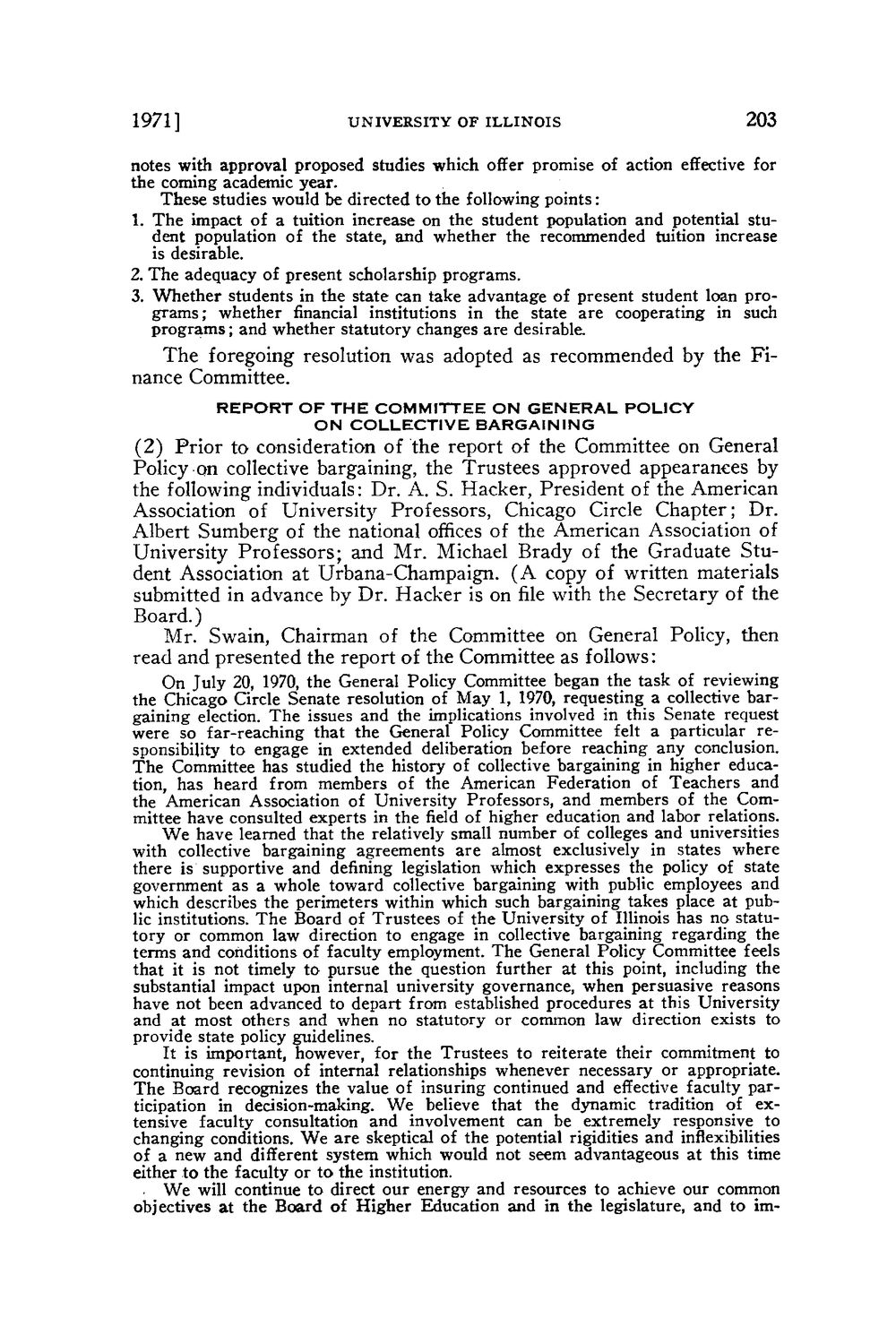| |
| |
Caption: Board of Trustees Minutes - 1972
This is a reduced-resolution page image for fast online browsing.

EXTRACTED TEXT FROM PAGE:
1971] UNIVERSITY OF ILLINOIS 203 notes with approval proposed studies which offer promise of action effective for the coming academic year. These studies would be directed to the following points: 1. T h e impact of a tuition increase on the student population and potential student population of the state, and whether the recommended tuition increase is desirable. 2. The adequacy of present scholarship programs. 3. Whether students in the state can take advantage of present student loan prog r a m s ; whether financial institutions in the state are cooperating in such p r o g r a m s ; and whether statutory changes are desirable. The foregoing resolution was adopted as recommended by the Finance Committee. REPORT OF THE COMMITTEE ON GENERAL POLICY ON COLLECTIVE BARGAINING (2) Prior to consideration of the report of the Committee on General Policy on collective bargaining, the Trustees approved appearances by the following individuals: Dr. A. S. Hacker, President of the American Association of University Professors, Chicago Circle Chapter; Dr. Albert Sumberg of the national offices of the American Association of University Professors; and Mr. Michael Brady of the Graduate Student Association at Urbana-Champaign. (A copy of written materials submitted in advance by Dr. Hacker is on file with the Secretary of the Board.) Mr. Swain, Chairman of the Committee on General Policy, then read and presented the report of the Committee as follows: On July 20, 1970, the General Policy Committee began the task of reviewing the Chicago Circle Senate resolution of May 1, 1970, requesting a collective bargaining election. T h e issues and the implications involved in this Senate request were so far-reaching that the General Policy Committee felt a particular responsibility to engage in extended deliberation before reaching any conclusion. T h e Committee has studied the history of collective bargaining in higher education, has heard from members of the American Federation of Teachers and the American Association of University Professors, and members of the Committee have consulted experts in the field of higher education and labor relations. W e have learned that the relatively small number of colleges and universities with collective bargaining agreements are almost exclusively in states where there is supportive and defining legislation which expresses the policy of state government as a whole toward collective bargaining with public employees and which describes the perimeters within which such bargaining takes place at public institutions. T h e Board of Trustees of the University of Illinois has no statutory or common law direction to engage in collective bargaining regarding the terms and conditions of faculty employment. The General Policy Committee feels that it is not timely to pursue the question further at this point, including the substantial impact upon internal university governance, when persuasive reasons have not been advanced to depart from established procedures at this University and at most others and when no statutory or common law direction exists to provide state policy guidelines. It is important, however, for the Trustees to reiterate their commitment to continuing revision of internal relationships whenever necessary or appropriate. T h e Board recognizes the value of insuring continued and effective faculty participation in decision-making. We believe that the dynamic tradition of extensive faculty consultation and involvement can be extremely responsive to changing conditions. W e are skeptical of the potential rigidities and inflexibilities of a new and different system which would not seem advantageous at this time either t o the faculty or to the institution. We will continue to direct our energy and resources to achieve our common objectives at the Board of Higher Education and in the legislature, and to im-
| |